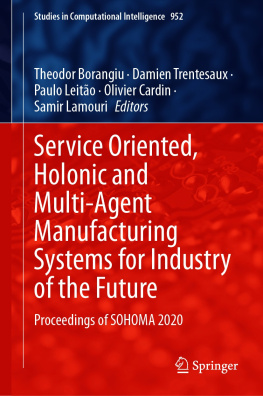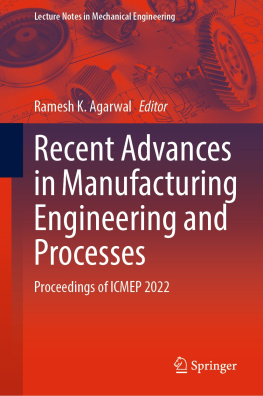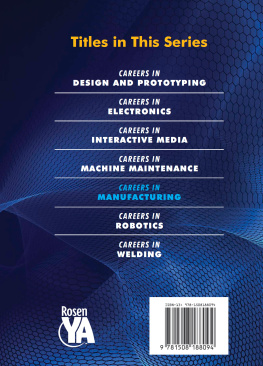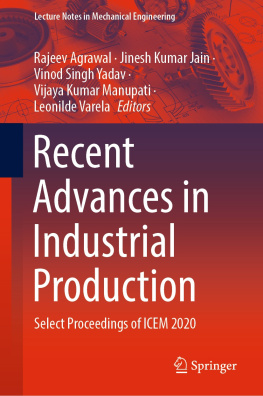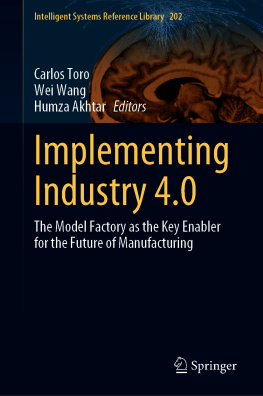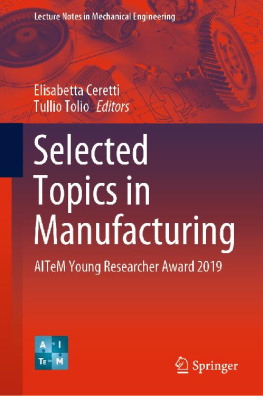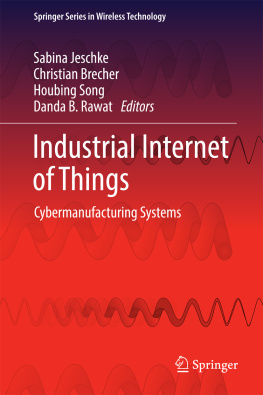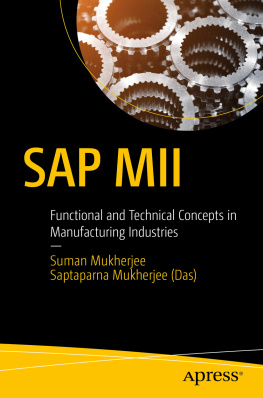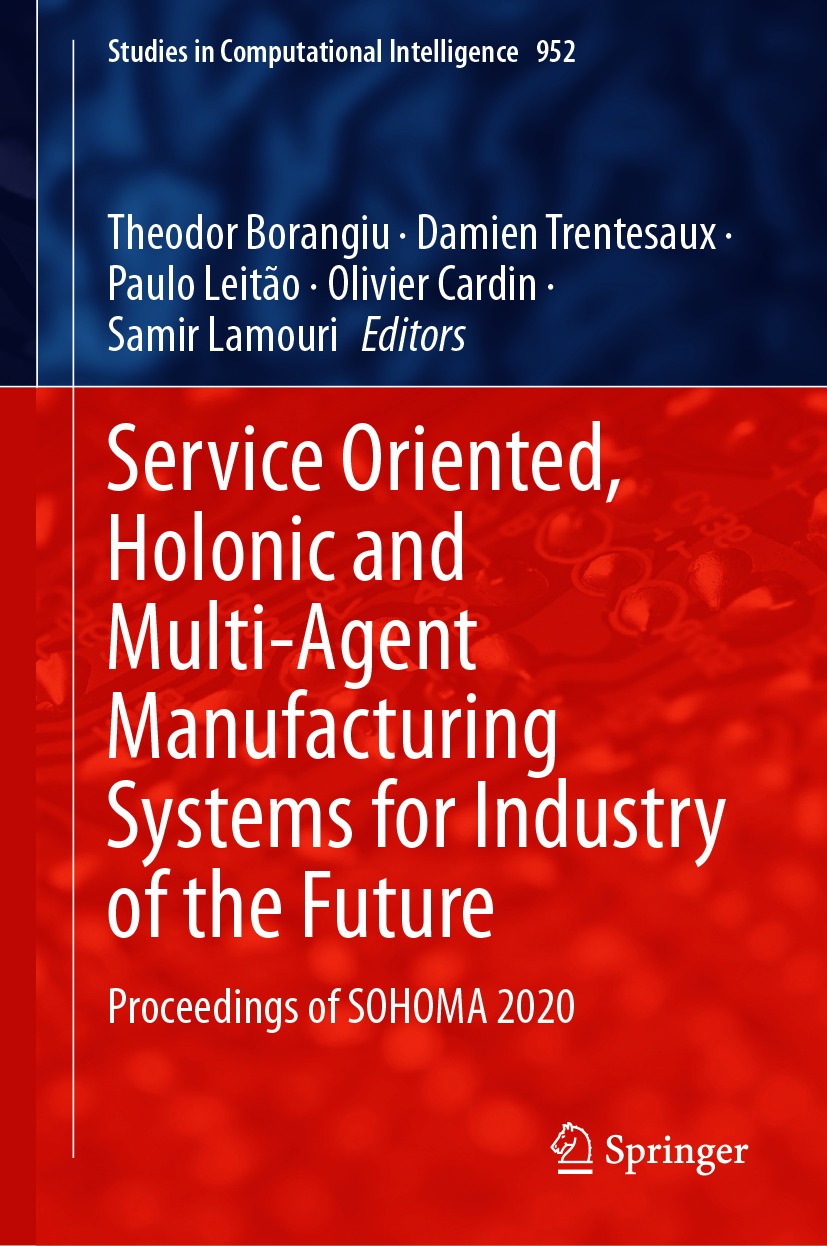Volume 952
Studies in Computational Intelligence
Series Editor
Janusz Kacprzyk
Polish Academy of Sciences, Warsaw, Poland
The series "Studies in Computational Intelligence" (SCI) publishes new developments and advances in the various areas of computational intelligencequickly and with a high quality. The intent is to cover the theory, applications, and design methods of computational intelligence, as embedded in the fields of engineering, computer science, physics and life sciences, as well as the methodologies behind them. The series contains monographs, lecture notes and edited volumes in computational intelligence spanning the areas of neural networks, connectionist systems, genetic algorithms, evolutionary computation, artificial intelligence, cellular automata, self-organizing systems, soft computing, fuzzy systems, and hybrid intelligent systems. Of particular value to both the contributors and the readership are the short publication timeframe and the world-wide distribution, which enable both wide and rapid dissemination of research output.
Indexed by SCOPUS, DBLP, WTI Frankfurt eG, zbMATH, SCImago.
All books published in the series are submitted for consideration in Web of Science.
More information about this series at http://www.springer.com/series/7092
Editors
Theodor Borangiu , Damien Trentesaux , Paulo Leito , Olivier Cardin and Samir Lamouri
Service Oriented, Holonic and Multi-Agent Manufacturing Systems for Industry of the Future
Proceedings of SOHOMA 2020
1st ed. 2021

Logo of the publisher
Editors
Theodor Borangiu
Faculty of Automatic Control and Computer Science, University Politehnica of Bucharest, Bucharest, Romania
Damien Trentesaux
Universit Polytechnique Hauts-de-France, Le Mont Houy, Valenciennes, France
Paulo Leito
Research Centre in Digitalization and Intelligent Robotics (CeDRI), Instituto Politcnico de Bragana, Campus de Santa Apolnia, Bragana, Portugal
Olivier Cardin
Department of Gnie Mecanique et Productique, Universit de Nantes, Carquefou, France
Samir Lamouri
LAMIH Arts et Mtiers Paris Tech, Paris, France
ISSN 1860-949X e-ISSN 1860-9503
Studies in Computational Intelligence
ISBN 978-3-030-69372-5 e-ISBN 978-3-030-69373-2
https://doi.org/10.1007/978-3-030-69373-2
The Editor(s) (if applicable) and The Author(s), under exclusive license to Springer Nature Switzerland AG 2021
This work is subject to copyright. All rights are solely and exclusively licensed by the Publisher, whether the whole or part of the material is concerned, specifically the rights of translation, reprinting, reuse of illustrations, recitation, broadcasting, reproduction on microfilms or in any other physical way, and transmission or information storage and retrieval, electronic adaptation, computer software, or by similar or dissimilar methodology now known or hereafter developed.
The use of general descriptive names, registered names, trademarks, service marks, etc. in this publication does not imply, even in the absence of a specific statement, that such names are exempt from the relevant protective laws and regulations and therefore free for general use.
The publisher, the authors and the editors are safe to assume that the advice and information in this book are believed to be true and accurate at the date of publication. Neither the publisher nor the authors or the editors give a warranty, expressed or implied, with respect to the material contained herein or for any errors or omissions that may have been made. The publisher remains neutral with regard to jurisdictional claims in published maps and institutional affiliations.
This Springer imprint is published by the registered company Springer Nature Switzerland AG
The registered company address is: Gewerbestrasse 11, 6330 Cham, Switzerland
Foreword
I would like to thank the SOHOMA Steering Committee for offering me the opportunity to share my views and ideas with the SOHOMA community and the manufacturing control and systems domain researchers at large. I worked in manufacturing control for more than twenty years and have witnessed the research progress of the domain from the first distributed architectures, including first holonic manufacturing systems models, to the myriad models for digital transformation of manufacturing through service orientation, and to the distributed intelligence models that are employed in what was recently called manufacturing as a service or shortly MaaS. The SOHOMA workshop, now at its anniversary tenth edition, has always kept with the times and even went through a few name changes to better capture the evolving nature of our work as a community. But, nevertheless, it always welcomed submissions from around the world covering cutting-edge manufacturing control modelling, promoted transformative research and moved forward the knowledge frontier. As confirmation, the last SOHOMA workshop held in October featured the overarching theme manufacturing as a servicevirtualizing and encapsulating manufacturing resources and controls into cloud networked services and, to name a few, included articles covering MaaS aspects such as cloud-based manufacturing control, digital twins in manufacturing, holonic and multi-agent process control, ethics and social automation, human factors integration, and physical Internet and logistics.
This foreword makes an attempt to capture the readers attention by highlighting current MaaS developments, as well as outline potential areas of research for the SOHOMA community and beyond. Manufacturing as a service includes local and potentially geographical distributed, service-oriented, knowledge-based smart manufacturing models that provide customized design and product solutions to individual or group-based customer types. It leverages technologies such as big data analytics, cloud, edge and fog computing, digital twins, artificial intelligence/machine learning (AI/ML), including deep learning, 3D printing, 5G broadband and SDN networks, and Internet of things. All within constraints such as high efficiency, safety of operations, cybersecurity of digital transactions, ethics, humanmachine interaction, low energy consumption and reduced logistics imprint. Including synergistic processes such as design as a service (DaaS), predict as a service (PraaS) and maintain as a service (MAaaS) results in bringing into being of a robust, responsive, secure, value chain-based and customer-oriented MaaS ecosystem that goes beyond the separate smart factory or digital manufacturing solutions. The quintessential research objective to accomplish this vision is to investigate the seamless integration of the above technologies into the MaaS ecosystem. SOHOMA researchers already started the heavy lifting for this daring task by building on the previous editions of the workshop and especially on the work presented at the current anniversary edition.
While I cannot address here all the above-named MaaS technologies and their constraint-based ecosystem integration, I will be making the case for the MaaS AI/ML-based control software and cybersecurity assessment for future manufacturing systems. In future, tailored MaaS computational software systems will be enabled by sensor-equipped resources, scalable data infrastructure, fast and reliable secure communications, cloud, edge and fog computing, real-time operating systems and predictive analytics. AI/ML adaptive control systems will increase the generality and scale of the search space and include remote possible combinations of inputs, controls and environmental conditions. Hence, AI/ML systems will be able to select among many feasible system responses, including some that otherwise might have been overlooked. Algorithm training will eliminate responses that do not provide the optimal control action and responses for which the control action is provided too late, too early, or out of sequence, or applied too long or stopped too soon. AI/ML systems will have provisions for outlier detection and work with sets of data having some or all of the known big data V characteristics: volume, variety, velocity, volatility, value and variability. The big step forward towards what is called artificial general intelligence (AGI) domain should not make a detour for manufacturing control and initial characteristics of AGI, such as the below, are expected to be implemented in the decades to come:

